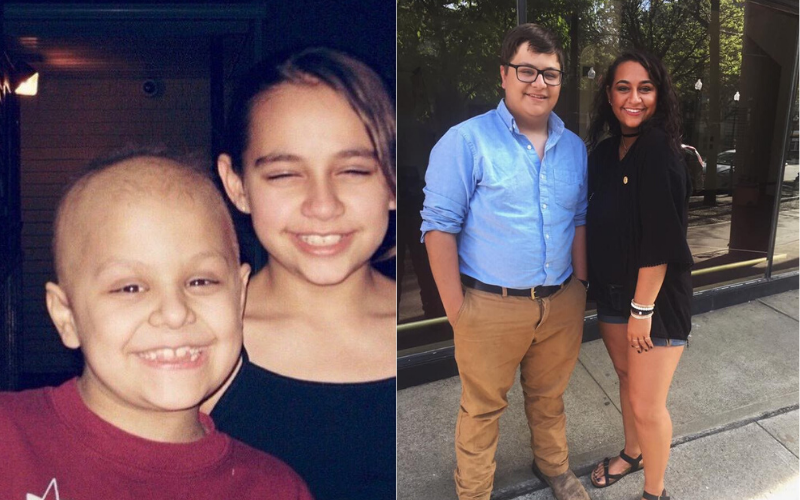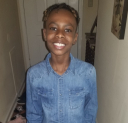
Then and Now: Cass was just 10 years old, when her brother Jimmy was diagnosed with leukemia.
By: Trish Adkins
Cass Butler was just 10 when her brother was diagnosed with childhood cancer. That experience changed the entire trajectory of her life.
“I didn’t understand because he looked and felt fine,” remembers Cass.
The hospital became a home away from home for Cass and her family. Every evening, Cass, her other brother and father would make the drive to the hospital for dinner as a family. Cass knew all the places to hide and the best treats to get at the hospital.
“Pediatric cancer changes a family in a way nothing else really can,” said Cass, who is now 26 years old and a nurse.
Cass, like other siblings of children with cancer, was forced to navigate the sudden shift from normal life to cancer life. A sibling’s diagnosis can deeply disrupt a child’s sense of normalcy and predictability.
“Siblings experience their brother or sister’s cancer while they are growing up and learning to make sense of the world. This often leaves siblings feeling confused and overwhelmed,” said Dr. Kristin Long, an ALSF grantee and pediatric psychologist from Boston University.
According to Dr. Long, siblings will have mixed feelings — they may understand what is happening, but still feel frustrated or left out. They may be afraid. They may be angry. And they also may feel positive emotions — like compassion and family closeness.
Dr. Long shared with us some ways to help children through a sibling’s cancer diagnosis:
1. Include siblings in the cancer diagnosis and treatment.
Explain the cancer diagnosis honestly, but also in an age-appropriate way to siblings. Dr. Long recommends asking your child’s treatment team for ideas about how to describe your child’s specific diagnosis and treatment plan. You can also consider bringing them to clinic so they can see what is happening and understand what their sibling is going through. It can be helpful for siblings to see, rather than avoid, the medical setting.
2. Small gestures can go a long way.
Families have a great deal of stress and responsibility managing practical and emotional aspects of a child’s cancer treatment, and it can be hard to make time to support siblings’ needs, as well. If you know a family affected by cancer, know that small gestures specific to the affected sibling can go a long way to make them feel important and supported. When loved ones ask how they can help, let them know they can send cards and gifts to siblings and be a listening ear and comfort to your child.
3. Even if the sibling seems to be coping very effectively, there is a good chance that they could still benefit from some extra support.
Siblings don’t always disclose how they are feeling, either to protect parents from added stress or because they don’t want to feel or talk about unpleasant emotions. Some siblings may even try to compensate for the family’s cancer-related stress by trying to be perfect. This can make it difficult to know how and when to provide support to siblings. Dr. Long recommends asking as a way to communicate to your child that you care about their emotions. It also sends the message that it is okay to feel and talk about strong feelings — both good and bad.
4. Take cues from the sibling and support them on their timeline.
Many siblings don’t show their feelings right away. It is not uncommon for siblings to seem fine in the weeks or months (or even years) following your child’s cancer diagnosis, but then for strong emotional or behavioral reactions to surface later on. This is normal.
5. Children with cancer and their parents may receive support in the hospital or clinic setting, but siblings are rarely there.
Siblings are not in the medical setting as often and therefore don’t have access or time with support staff, despite having their own complex needs. Siblings can benefit from being enrolled in cancer-specific programs such as SuperSibs powered by Alex’s Lemonade Stand (mailings and web-based resources) or attending oncology camps, many of which have opportunities for sibling involvement. When siblings have more trouble coping with strong cancer-related emotions, community- or school-based psychologists or social workers may be able to help.
Updated
April 3, 2023
First Published

